

Racial Profiling - It Works. Sunday on Meet the Press, a panel convened to discuss the Trayvon Martin story - the story of the black teenager getting shot by the Hispanic man in Florida.
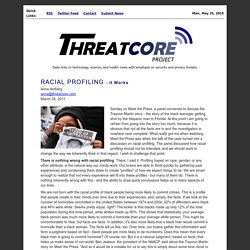
At this point I am going to refrain from going into the story too much, because it is obvious that not all the facts are in and the investigation is nowhere near complete. What really got me when watching Meet the Press was when the talk of the case turned into a discussion on racial profiling. The panel discussed how racial profiling should not be tolerated, and we should work to change the way we inherently think in that regard. I wish to challenge that point. There is nothing wrong with racial profiling. We are not born with the racial profile of black people being more likely to commit crimes. The Implicit Association Test is a test psychologists use to test bias. What Really Happened in Cincinnati by Heather Mac Donald, City Journal Summer 2001.
Everyone says that the riots were a protest against racism and oppression.
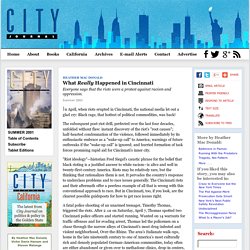
In April, when riots erupted in Cincinnati, the national media let out a glad cry: Black rage, that hottest of political commodities, was back! The subsequent post-riot drill, perfected over the last four decades, unfolded without flaw: instant discovery of the riot’s "root causes"; half-hearted condemnation of the violence, followed immediately by its enthusiastic embrace as a "wake-up call" to America; warnings of future outbreaks if the "wake-up call" is ignored; and hurried formation of task forces promising rapid aid for Cincinnati’s inner city. "Riot ideology"—historian Fred Siegel’s caustic phrase for the belief that black rioting is a justified answer to white racism—is alive and well in twenty-first-century America. Riots may be relatively rare, but the thinking that rationalizes them is not. It pervades the country’s response to underclass problems and to race issues generally.
"Is he crazy? Rodney King - Biography - When a mostly white jury acquitted the police officers who were caught on video beating Rodney King, it set off the L.A. riots of 1992.
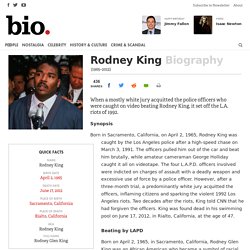
Synopsis Born in Sacramento, California, on April 2, 1965, Rodney King was caught by the Los Angeles police after a high-speed chase on March 3, 1991. The officers pulled him out of the car and beat him brutally, while amateur cameraman George Holliday caught it all on videotape. The four L.A.P.D. officers involved were indicted on charges of assault with a deadly weapon and excessive use of force by a police officer. The Early Days of American Law Enforcement. The Early Days of American Law Enforcement The Watch More than 350 years ago, America’s first known system of law enforcement was established in Boston.
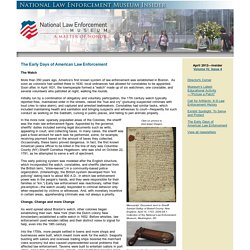
As soon as colonists had settled there in 1630, local ordinances had allowed for constables to be appointed. Soon after, in April 1631, the townspeople formed a “watch” made up of six watchmen, one constable, and several volunteers who patrolled at night, walking the rounds. Initially run by a combination of obligatory and voluntary participation, the 17th century watch typically reported fires, maintained order in the streets, raised the “hue and cry” (pursuing suspected criminals with loud cries to raise alarm), and captured and arrested lawbreakers. History of Law Enforcement - Police History. Police History In the beginning, there was kin policing, with its penchant for blood feuding and traditions of tribal justice.
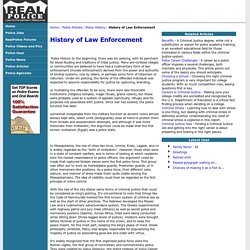
Many pre-civilized villages or communities are believed to have had a rudimentary form of law enforcement (morals enforcement) derived from the power and authority of kinship systems, rule by elders, or perhaps some form of totemism or naturism. Under kin policing, the family of the offended individual was expected to assume responsibility for justice by capturing, branding, or mutilating the offender. To be sure, there were also theocratic institutions (religious temples, magic rituals, grand viziers), but these were probably used as a system of appeals (sanctuary, refuge) and for purposes not associated with justice. A Brief History of The USA. The civil war was finally provoked by the election of Abraham Lincoln 1809-1865 as president.

Lincoln did not believe he had the power to abolish slavery in states where it already existed. However he firmly opposed the expansion of slavery into territories of the USA, which were likely to become states in future. His policy meant that in future free states would outnumber slave ones. As a result of his election South Carolina ceded from the union on 20 December 1860. Mississippi, Florida, Alabama, Georgia, Louisiana and Texas followed it early in 1861. Fighting began on 12 April 1861. Following Fort Sumter Arkansas ceded from the union on 6 May 1861. Slavery in America - Black History.
Types of Slavery in Africa. By Alistair Boddy-Evans Updated July 23, 2016.
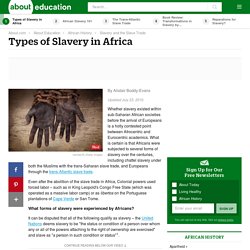
Whether slavery existed within sub-Saharan African societies before the arrival of Europeans is a hotly contested point between Afrocentric and Eurocentric academics. What is certain is that Africans were subjected to several forms of slavery over the centuries, including chattel slavery under both the Muslims with the trans-Saharan slave trade, and Europeans through the trans-Atlantic slave trade.
Even after the abolition of the slave trade in Africa, Colonial powers used forced labor – such as in King Leopold's Congo Free State (which was operated as a massive labor camp) or as libertos on the Portuguese plantations of Cape Verde or San Tome. What forms of slavery were experienced by Africans? Continue reading below our video Chattel Slavery Chattel slaves are property and can be traded as such. Htus8008.pdf. Do black Americans commit more crime?
FACTS: Cops Kill Whites at Almost Double The Rate That Cops Kill Blacks. Here are some statistics that are being roundly ignored by a media eager to push the lies that ooze out of Al Sharpton’s mouth on a daily basis: The real statistics show that cops kill whites at almost double the rate that they kill blacks.

Talks show host and columnist Larry Elder did some actual research (something the old media establishment avoids) and found that the claim that blacks are killed by cops more often than whites are killed is simply untrue. In fact, he found that the death by cop for blacks is down 75 percent since 1999.